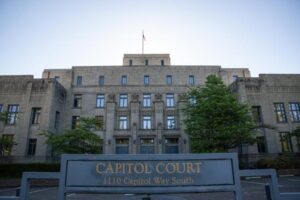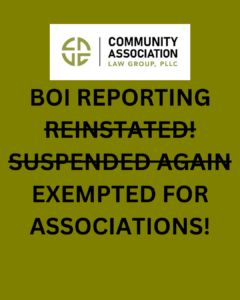Hopefully, most communities in Washington have now heard about WUCIOA (the Washington Uniform Common Interest Ownership Act) and know that this new statute will replace both Condominium Acts and the HOA Act in Washington as of January 1, 2028.
But did you know that the legislative bill that everyone thought was just intended to fix egregious errors in WUCIOA actually makes MORE of WUCIOA apply to pre-existing communities way ahead of 2028?
SSB 5129 was passed by both houses with little opposition and was signed by the governor on April 22, 2025. The focus of the bill was supposed to be fixing some of the more egregious errors in WUCIOA. Instead, some changed sections have an effective date of January 1, 2026 – that’s right, not 2028, but 2026. Some of thechangesthat will apply to all communities on this date represent a significant departure from what I and my colleagues on the WUCIOA drafting committee originally drafted and are simply contrary to principles of good corporate governance.
This blog is the first of a series in which we will identify changes made to WUCIOA this year through SSB 5129. Today, I wanted to let you know about the changes to voting requirements that will apply to all communities in January when the heavily revised RCW 64.90.445 will be applied to all pre-existing communities. (See change to RCW 64.90.095).
As provided in SSB 5129, RCW 64.90.445 will apply to all communities next year. Here are some of the changes pre-existing communities will have to adjust to:
- Open Board Meetings. For all Board meetings and meetings of non-advisory committees, meetings must be open to the Owners except during executive session.
- This is a huge change for condos, where meetings were not required to be open.
- It is also a huge change for HOAs because the new requirements don’t just allow Owners to attend, but they have a right to both notice and an opportunity to speak (read on . . .).
- Required Notice to Owners of Board Meetings. Gone are the days of boards being able to get a quick meeting together informally to discuss an important and timely topic prior to the next meeting. Unless the meeting is included in a schedule published to the Owners for the year, notice of BOARD meetings must now be given to all Owners at least 14 days prior to the Board meeting. The requirement was changed somewhat this year, but still does not allow the flexibility a board may need because the board may have a meeting with only 7 days’ notice to owners if the board meeting is to address an issue that could not have reasonably been foreseen. This section also allows email notice to Owners even though they have not opted into email notice, unlike ALL other sections of WUCIOA.
- This change is going to be challenging for pre-existing communities to comply with because issues arise all of the time that need to be addressed immediately and cannot wait 7 or 14 days.
- For example, if a leak occurs and the Association needs to make a decision on whether to file a claim, the Board cannot legally do so for at least seven days.
- Even so, this requirement would not be so bad but for other restrictions on board meetings noted below.
- There are no longer any exceptions to this rule for “emergency” situations.
- Owners are Entitled to Speak at all Board meetings and get to speak FIRST on agenda issues. The statute states: “At each board meeting, the board must provide a reasonable opportunity for unit owners to comment regarding matters affecting the common interest community. The board must provide at least 15 minutes at the beginning of each meeting for unit owners to comment about agenda items before the board votes. The board may place reasonable time restrictions of not less than 90 seconds per owner per unit, except that the time per owner per unit may be reduced and allocated equally if more than 10 unit owners wish to comment.”
- The requirement to give Owners 15 minutes of comment at the beginning of a meeting was added this year, but it does NOT change the fact that the first sentence says that comments do not need to be limited to those on the agenda. Remember that this is for BOARD meetings, not Owner meetings.
- The requirement to allow all topics of discussion does not allow the Board to control the flow of the meeting, will make Board meetings longer, and will likely make it more difficult for Boards to get work done during any Board meeting.
- This requirement is contrary to good governance, which otherwise balances the right of Owner contribution with the reality that Boards need to make their meetings efficient in order to get work done.
- Purpose of Executive Sessions are Very Limited. Executive session is limited to certain topics, with no accounting for other potentially privileged or sensitive discussions. The statute provides that executive session is only appropriate for:
- Consulting with the Association’s attorney on legal matters;
- Discussing potential litigation, mediation, arbitration or administrative proceedings;
- Discussing labor or personnel matters (referring to employees of the association, not Owners);
- Discussing contracts under negotiation but only “if premature general knowledge of those matters would place the association at a disadvantage”; or
- If the Board determines that public knowledge of the discussion would violate the privacy of any person.
- There is no catch-all for any other executive session topic, so Boards will have to be very careful to limit their executive sessions to these few topics.
- Boards Can No Longer Make Unanimous Decisions Outside of Board Meetings (unless it’s a Developer-controlled Board).
- Contrary to good governance, this section no longer allows Boards to make unanimous decisions outside of Board meetings unless they are “ministerial”, will be ratified by the Owners, or to implement prior decisions.
- So Boards can make NO LEGAL DECISIONS unless they are at a board meeting and all board meetings require AT LEAST 7 day’s notice to the Owners because ministerial acts (whatever that means, as it is ambiguous and nowhere defined) are generally delegated to either the manager or director during a meeting.
- The legislature chose to give Developer-controlled Boards an exception to this, probably recognizing the number of decisions they need to make outside of meetings, but they had no qualms making it more difficult for voluntary boards? This seems really backwards.
- Contrary to good governance, this section no longer allows Boards to make unanimous decisions outside of Board meetings unless they are “ministerial”, will be ratified by the Owners, or to implement prior decisions.
Again, these changes will be effective January 1, 2026, and will apply to all pre-existing communities. Thus, it is likely that some portion of your Declaration or Bylaws relating to Board meetings will be invalidated by these changes. Contact us for information on how to bring your documents in compliance without fully opting into WUCIOA, or what it means to “opt in” early. Stay tuned for future articles on the effects of the “WUCIOA fix” bill, SSB 5129!






